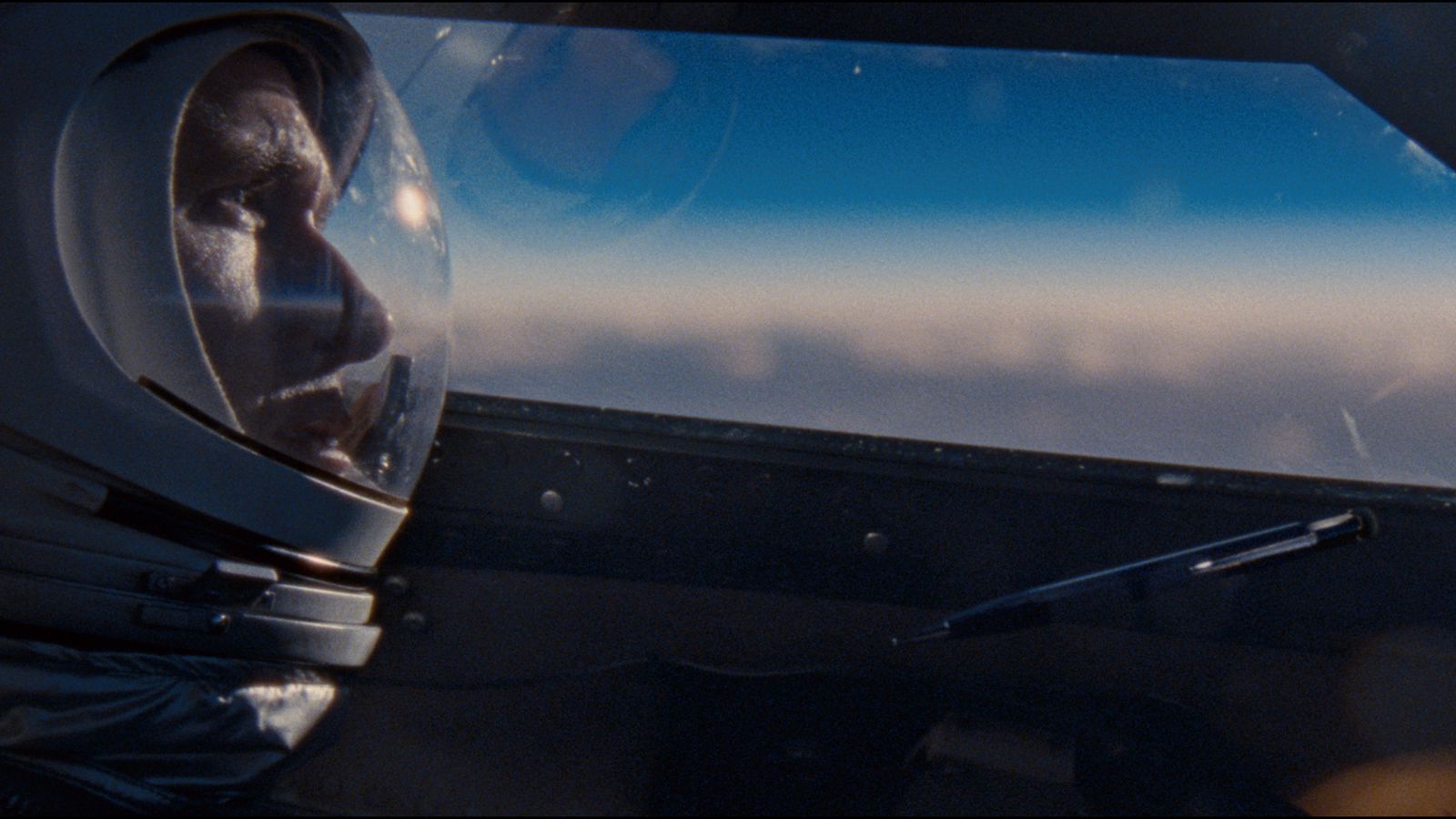
MPAA Rating: PG-13 | Rating: ★★★★
Release year: 2018
Genre: Biography, Drama, History Director: Damien Chazelle
“I was pleased.”
This is Neil Armstrong’s repeated response to the reporters questioning him on how he felt about NASA’s decision to have him command the upcoming Apollo 11 mission to land on the moon. What were his thoughts, his feelings, his existential longings, his spiritual reflections? “I was pleased,” is all he feels the need to say. Those three words are still more than “Okay,” the repeated refrain Armstrong uses when receiving various critical news, revelations which would make most collapse into weeping or jump up and down for joy. “Okay,” is all. “Okay” has to be enough.
Ryan Gosling’s portrayal of the stoic astronaut in Damien Chazelle’s biopic First Man imbues him with a brooding calmness, a sense that he is seething inside while remaining cool and in control on the surface (on the Enneagram, he’s probably a Type One). In the thrilling opening scene, he’s essentially in the nose of a rocket, launched to the edge of Earth’s atmosphere before plummeting back to the ground, cooly flipping switches and gripping controls with nerves of steel. It’s a perfect opening for what’s to come, the literal and figurative ups and downs of an astronaut’s life during the Space Race of the tumultuous 1960s. Gosling plays the strong silent type well–he’s done a form of this performance in Drive, Only God Forgives, The Place Beyond the Pines, even Lars and the Real Girl. Chazelle and Gosling are interested in Armstrong as The Isolated Man, a person trying to keep things under control when both life in space and life on earth are anything but predictable or steady.
Neil and his wife Janet (Claire Foy, in a stellar performance), paradoxically navigate his isolation together. She’s more than just the traditional supportive wife who sits on the sidelines as a cheerleader (lovingly parodied here). She and Neil must endure the painful loss of a child, a three-year-old daughter with cancer, then the subsequent losses of various friends in NASA accidents and mishaps. As Janet puts it to a NASA handler (Kyle Chandler) trying to reassure her, “You’re a bunch of boys making models out of balsa wood! You don’t have anything under control!” In the aftermath of one of these out-of-control accidents, Janet tells some friends that she and Neil had gotten pretty good at funerals in the past–they’re used to the loss. In this, the life of NASA families has strong parallels to military life, with spouses and children living in close proximity as emotional support as husbands work long hours and risk their lives for the sake of yet another mission. A major difference: they aren’t going to war to kill people (despite the underlying Cold War motives for the Space Race) but rather to expand the horizons of human achievement and thus unite the world. First Man has been wrongly criticized for not being patriotic enough or showing the planting of the American flag (spoiler: there are plenty of American flags in the film), but I think it aims to eschew both liberal and conservative ideologies in its focus on the psychology of Armstrong the Human more than Armstrong the American. It’s not a-political–we see scenes with senators in the White House, Russian cosmonauts challenging American pursuits, and a thrilling performance of Gil Scott-Heron’s “Whitey On the Moon”–but it’s also not falling into the trappings of prevailing us/them mentalities in contemporary American discourse.
Indeed, First Man can unite us. My wife and I watched the film in a theater full of people of Armstrong’s generation; an older couple, some friends from church, spoke with us afterward and fondly recalled watching the moon landing on TV live, nearly 50 years ago in 1969. The gleam in the older British gentleman’s eyes as he remembered the moment was as affecting as any of the number of emotional moments within First Man itself: “We were all watching” he said with a nostalgic awe. Such awe came over me watching Armstrong’s lunar surface landing; it’s a beautiful sequence, with a fantastic score from Justin Hurwitz. Sadly, it seems few are watching First Man, as its box office numbers remain behind the likes of Venom and Halloween. Which is tragic, for First Man is both an affective celebration of human achievement as well as a stunning cinematic thrill ride. I watched it on a very small theater screen and I was nearly overwhelmed by the various adventures in space Armstrong endures, especially in the moments where something goes wrong; a sustained roll in Armstrong’s Gemini 8 mission is Gravity-levels of dizzying, to the point where I’m not sure I could have endured it on a larger screen). The realism is palpable and procedural, the detailed symphony of sound and image in perfect harmonious sequences, orchestrated with an engineer’s exactitude while never feeling cold or distant (perhaps akin to moments in Christopher Nolan’s Interstellar). There were moments when I forgot I was watching a performance of the events rather than the events themselves, as if Chazelle had used a time machine to plant cameras throughout the NASA missions, as if Gosling had somehow become Armstrong. The best biopics–the best films–do just this: like Bazin’s myth of total cinema, they are portals in time and space to connect us to reality itself, whether as vast as space or as intimate as the human heart. So, I was pleased … I was pleased.
IMDB Listing: https://www.imdb.com/title/tt1213641/
Leave a Reply